【新课标】Unit10 If you go to the party, you'll have a great time Section B(2a-2e)课件
文档属性
| 名称 | 【新课标】Unit10 If you go to the party, you'll have a great time Section B(2a-2e)课件 |  | |
| 格式 | pptx | ||
| 文件大小 | 2.4MB | ||
| 资源类型 | 试卷 | ||
| 版本资源 | 人教新目标(Go for it)版 | ||
| 科目 | 英语 | ||
| 更新时间 | 2022-11-09 16:17:04 | ||
图片预览

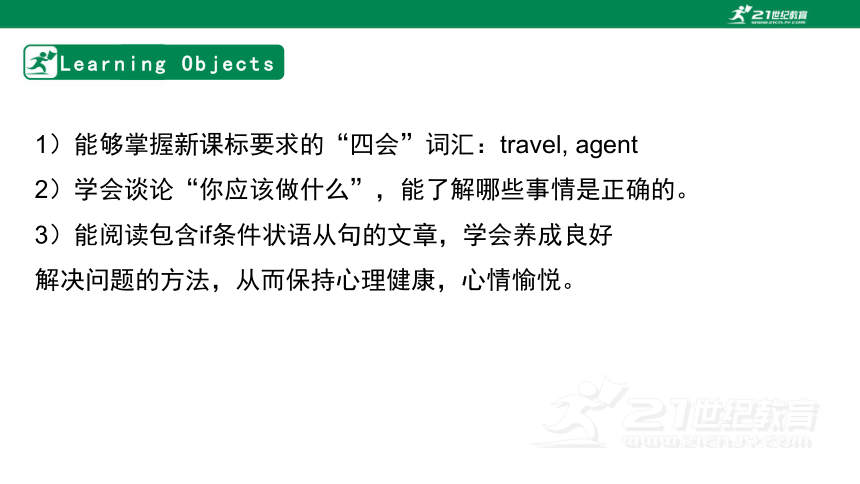

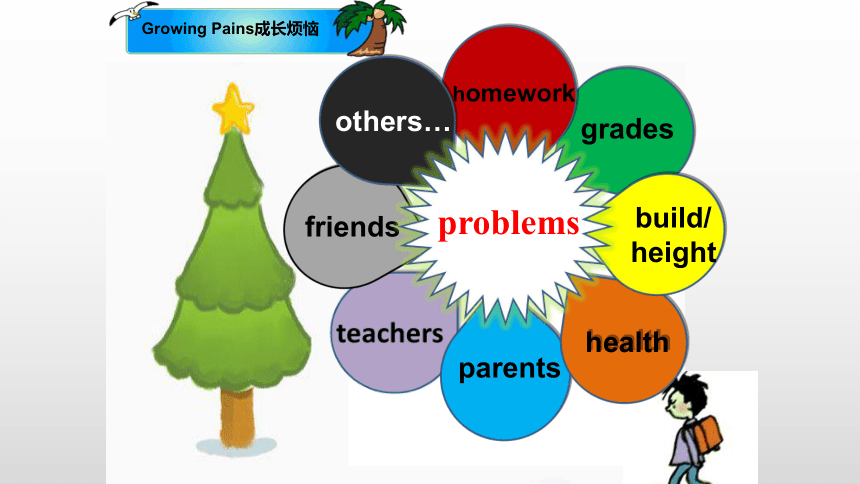
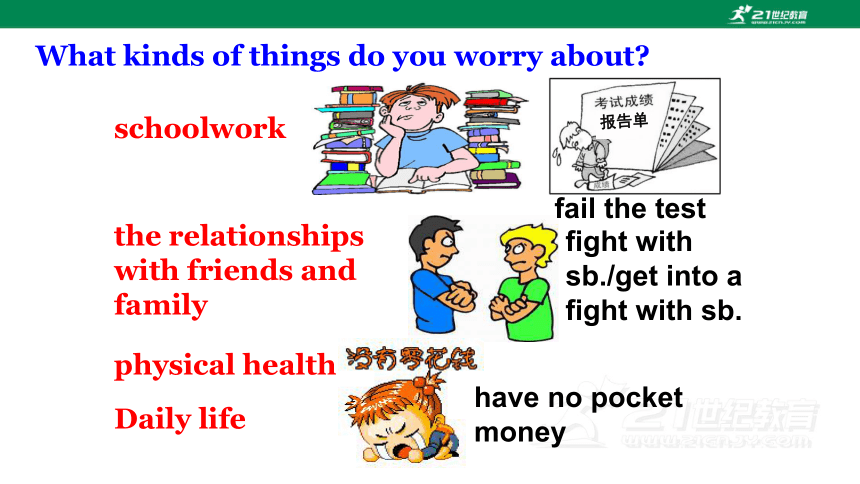


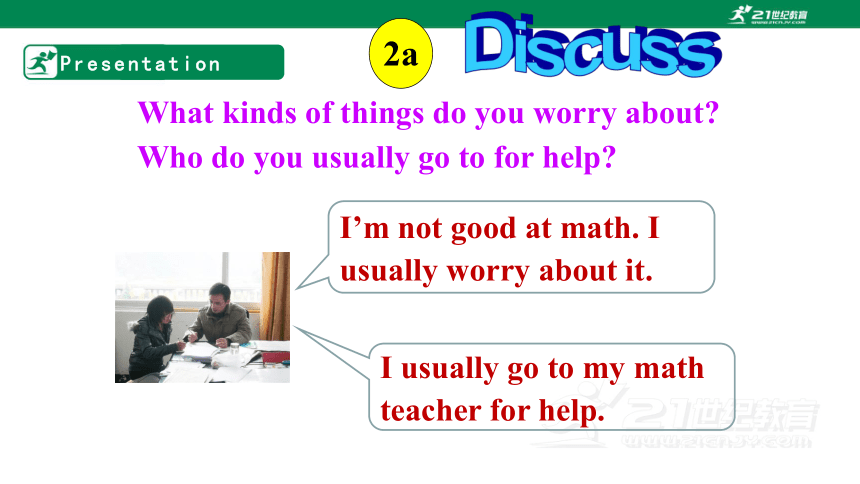
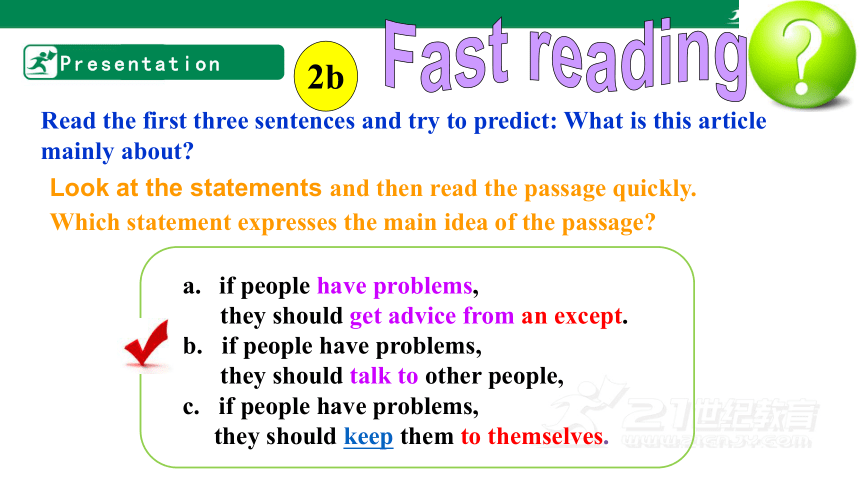
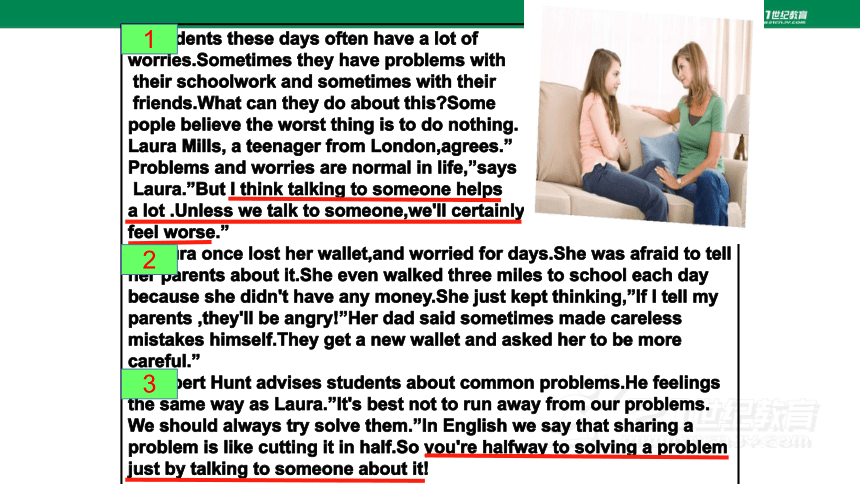


文档简介
(共35张PPT)
Unit10 If you go to the party, you'll have a great time
SectionB (2a-2e)
人教版八年级上册
Learning Objects
1)能够掌握新课标要求的“四会”词汇:travel, agent
2)学会谈论“你应该做什么”,能了解哪些事情是正确的。
3)能阅读包含if条件状语从句的文章,学会养成良好
解决问题的方法,从而保持心理健康,心情愉悦。
What kinds of things do you worry about Who do you usually go to for help
Free talk
Lead in
friends
parents
health
grades
build/
height
homework
others…
Growing Pains成长烦恼
problems
What kinds of things do you worry about
报告单
schoolwork
the relationships with friends and family
fight with sb./get into a fight with sb.
Daily life
physical health
fail the test
have no pocket money
Who do you usually go to for help if you
have problems and worries
Your parents.
Your teachers.
Your friends.
D. An expert.
As teenagers, we can find someone to help
us solve/ work out problems .
( 解 决 )
E. Nobody. Just keep problems to yourselves.
( 保 密 )
专家讲座
What do you think is the best way to solve a problem
secret
I think the best way to solve a problem is by listening to music/ … .
How do you feel if you don’t solve a problem
Discuss
What kinds of things do you worry about Who do you usually go to for help
2a
I’m not good at math. I usually worry about it.
I usually go to my math teacher for help.
Presentation
if people have problems,
they should get advice from an except.
b. if people have problems,
they should talk to other people,
c. if people have problems,
they should keep them to themselves.
Fast reading
2b
Look at the statements and then read the passage quickly. Which statement expresses the main idea of the passage
Read the first three sentences and try to predict: What is this article mainly about
Presentation
Students these days often have a lot of
worries.Sometimes they have problems with
their schoolwork and sometimes with their
friends.What can they do about this Some
pople believe the worst thing is to do nothing.
Laura Mills, a teenager from London,agrees.”
Problems and worries are normal in life,”says
Laura.”But I think talking to someone helps
a lot .Unless we talk to someone,we'll certainly
feel worse.”
Laura once lost her wallet,and worried for days.She was afraid to tell her parents about it.She even walked three miles to school each day because she didn't have any money.She just kept thinking,”If I tell my parents ,they'll be angry!”Her dad said sometimes made careless mistakes himself.They get a new wallet and asked her to be more careful.”
Robert Hunt advises students about common problems.He feelings the same way as Laura.”It's best not to run away from our problems. We should always try solve them.”In English we say that sharing a problem is like cutting it in half.So you're halfway to solving a problem just by talking to someone about it!
1
2
3
wallet n. 钱包
teenager n.
(13~19) 青少年
mile n. 英里 one mile=1760yards=1.609km
New words
e.g. It’s a mile’s way from my home to
school. 从我家到学校有一英里。
expert n. 专家
an expert in… 在……方面的专家
normal adj. 正常的;一般的
e.g. It was a normal summer night.
那是一个寻常的夏夜。
unless conj. (=if not)除非;如果不.主将从现
e.g. You’ll be late unless you go at once.
=You’ll be late if you don’t go at once.
如果你不立即走,你会迟到。
understanding adj. 善解人意的;体谅人的
e.g. Mr. Li is a very understanding
person.
李先生是一位很善解人意的人。
himself pron. 他自己
themselves pron. 他(她、它)们自己
宾格或物主代词+ self/selves → 反身代词
e.g. The old man taught himself English.
那位老人正在自学英语。
e.g. It’s certainly a good suggestion.
这无疑是一个好建议。
certainly adv. 当然;行;无疑;肯定.该词的同义词:sure/ of course. Certain为adj.
e.g. Mr. Miller was very angry with Tom.
米勒老师对汤姆很生气。
angry adj. 生气的;发怒的
be angry with sb. 对某人生气 be angry at sth. 因某事而生气
e.g. She made mistakes again and again.
她三番五次地犯错。
mistake n. 失误;错误
make a mistake/make mistakes 犯错误
mistake v. 弄错;犯错误 mistook是它的过去式 We mistook her for her twin sister.
careful adj. 细致的;精心的;慎重的 carefully adv. 用于修饰动词做状语
e.g. He is a careful driver. He’s never
careless in driving.
careless adj. 粗心的;不小心的 carelessly adv. carelessness n.
反义词
advise v. 劝告;建议
e.g. The doctor advised me to give up
smoking.
医生建议我戒烟。
advise(动词)→advice (名词)建议
advise sb. to do sth. 建议某人做某事 advise sth. 建议某事
The doctor advised a complete rest.
keep…to oneself 保守秘密
solve v. 解决;解答
e.g. He’s trying to solve the problem.
他正努力解决这个问题。
trust v. 相信;信任
e.g. Trust the honest boy.
相信那个诚实的孩子。
step n. 步;步骤
vt.& vi.举步,行走; 踩,踏上
e.g. What is the first step
第一个步骤是什么?
experience n. 经验(不可数);经历(可数)
e.g. He has no experience at all.
他完全没有经验。
halfway adv. 在中途;部分地做(或达到)
e.g. She lost her way halfway to the zoo.
她在去动物园的路上迷路了。
in half 分成两半
e.g. She cut the cake in half.
她将蛋糕切成两半。
Read Para1 carefully and fill in the boxes.
students’ problems
schoolwork
friends
solve
the worst thing
helps a lot
to do nothing
talking to someone
with
normal正常的
teenagers’
Laura
Why
Unless we talk to someone,we'll certainly feel worse.”
.
Laura lost her wallet
What did she do at first
What did she do in the end
What did her father say
What did her parents do
Read Para2 carefully and answer these questions.
She walked three miles to school each day.
She talked to her parents.
He said he sometimes made careless mistakes himself.
They got her a new wallet and asked her to be more careful.
What do you think of her parents
Understanding.
Robert Hunt advises students about common problems.
It's best not to ______________ their prolems,they should try to _____them.The first step is to find someone __________________. Students can ask their parents for help because they have ____________________ and _____________________ help us.
Read Para3 carefully and fill the blanks.
run away from
solve
you trust to talk to
more experience
are always there to
Opinion(观点)
way 1
way2
We're halfway to solving a problem by talking to someone about it!
Summary
What can we learn from the article
1. Problems and worries are normal in life.
2. It’s best not to run away from our problems.
3. Sharing a problem is like cutting it in half . You’re halfway to solving a problem just by talking to someone about it!
My friend _____has a problem now.
He / she ______________________.
problem
I think he / she should ___________
xxx thinks he/she should_________.
advice
If he /she can accept our advice,
he / she will____________________.
Let's report!
results
Fill in the blanks with the phrases in the box.
2d
discuss your problems
tell her parents
unless you talk
run away from
talk to someone
share her problems
to do nothing
Presentation
Students often have a lot of problems
and worries. Laura Mills thinks the worst thing is _____________. She thinks you’ll feel worse if you don’t ______________ about your problems. Laura remembers that she once lost her wallet and was afraid to _____________ about it. Now she believes you cannot feel better _______________ to someone.
to do nothing
talk to anyone
tell her parents
unless you talk
She says she will always __________________ in the future. Robert Hunt agrees with Laura. He thinks you should not _______________ your problems, but you should try to solve them. If you cannot talk to an expert like Robert, you can ____________________ with your parents because they have a lot of experience.
share her problems
run away from
discuss your problems
Students these days often have a lot of worries. Sometimes they have problems with their schoolwork, and sometimes with their friends. What can they do about this Some people believe the worst thing is to do nothing. Laura Mills, a teenager from London, agrees. “Problems and worries are normal in life,” says Laura. “But I think talking to someone helps a lot. Unless we talk to someone, we’ll certainly feel worse.”
Laura once lost her wallet, and worried for days. She was afraid to tell her parents about it. She even walked three miles to school each day because she didn’t have any money. She just kept thinking, “if I tell my parents, they’ll be angry!” In the end, she talked to her parents and they were really understanding. Her dad said he
sometimes made careless mistakes himself. They got her a new wallet and asked her to be more careful. “I will always remember to share my problems in the future!” Laura says.
Robot Hunt advises students about common problems. He feels the same ways as Laura. “It is best not to run away from our problems. We should always try to solve them.” He thinks the first step is to find someone you trust to talk to. This person doesn’t need to be an expert like himself. Students often forget that their parents have more experience than them, and are always there to them. In English, we say that sharing a problem is like cutting it in half. So you’re halfway to solving a problem just by talking to someone about it!
2e Ask three students the following questions. Take notes of their answers.
1. What problems do you have with schoolwork
2. Who do you talk to about these problems and why
3. Who else can you get advice from
4. Do you always tell your parents about your problems Why or why not
5. Do you ever give advice to your friends about their problems What advice do you give
Presentation
6. 在生活中问题和困扰是很正常的。
7. 对一些人说有很大帮助。
8. 问题被分担问题就被减半。
10. 我们不应该逃避问题。
11. 我们应该尽力解决问题。
Problems and worries are normal in life.
Talking to someone helps a lot.
A problem shared is a problem halved.
We should never run away from our problems.
We should try to solve the problems.
Exercise
翻译下列句子
12. 父母比我们有更多的经验。
13. 主要的事是寻找帮助。
14. 我曾经丢了钱包。
16. 我害怕告诉父母这件事。
Parents have more experience than us.
The main thing is to look /looking for help.
I once lost a wallet.
I was afraid to tell my patents about it.
(be afraid to do sth)
Exercise
Homework
Homework
1、Remember the key words and phrases.
2、Write a passage about your problem.
My problem is _______________________________________
My friend advise me _________________________________
If I accept the advice,I'll______________________________
3、尝试一次与父母的有效沟通。
谢谢
21世纪教育网(www.21cnjy.com)
中小学教育资源网站
兼职招聘:
https://www.21cnjy.com/recruitment/home/admin
Unit10 If you go to the party, you'll have a great time
SectionB (2a-2e)
人教版八年级上册
Learning Objects
1)能够掌握新课标要求的“四会”词汇:travel, agent
2)学会谈论“你应该做什么”,能了解哪些事情是正确的。
3)能阅读包含if条件状语从句的文章,学会养成良好
解决问题的方法,从而保持心理健康,心情愉悦。
What kinds of things do you worry about Who do you usually go to for help
Free talk
Lead in
friends
parents
health
grades
build/
height
homework
others…
Growing Pains成长烦恼
problems
What kinds of things do you worry about
报告单
schoolwork
the relationships with friends and family
fight with sb./get into a fight with sb.
Daily life
physical health
fail the test
have no pocket money
Who do you usually go to for help if you
have problems and worries
Your parents.
Your teachers.
Your friends.
D. An expert.
As teenagers, we can find someone to help
us solve/ work out problems .
( 解 决 )
E. Nobody. Just keep problems to yourselves.
( 保 密 )
专家讲座
What do you think is the best way to solve a problem
secret
I think the best way to solve a problem is by listening to music/ … .
How do you feel if you don’t solve a problem
Discuss
What kinds of things do you worry about Who do you usually go to for help
2a
I’m not good at math. I usually worry about it.
I usually go to my math teacher for help.
Presentation
if people have problems,
they should get advice from an except.
b. if people have problems,
they should talk to other people,
c. if people have problems,
they should keep them to themselves.
Fast reading
2b
Look at the statements and then read the passage quickly. Which statement expresses the main idea of the passage
Read the first three sentences and try to predict: What is this article mainly about
Presentation
Students these days often have a lot of
worries.Sometimes they have problems with
their schoolwork and sometimes with their
friends.What can they do about this Some
pople believe the worst thing is to do nothing.
Laura Mills, a teenager from London,agrees.”
Problems and worries are normal in life,”says
Laura.”But I think talking to someone helps
a lot .Unless we talk to someone,we'll certainly
feel worse.”
Laura once lost her wallet,and worried for days.She was afraid to tell her parents about it.She even walked three miles to school each day because she didn't have any money.She just kept thinking,”If I tell my parents ,they'll be angry!”Her dad said sometimes made careless mistakes himself.They get a new wallet and asked her to be more careful.”
Robert Hunt advises students about common problems.He feelings the same way as Laura.”It's best not to run away from our problems. We should always try solve them.”In English we say that sharing a problem is like cutting it in half.So you're halfway to solving a problem just by talking to someone about it!
1
2
3
wallet n. 钱包
teenager n.
(13~19) 青少年
mile n. 英里 one mile=1760yards=1.609km
New words
e.g. It’s a mile’s way from my home to
school. 从我家到学校有一英里。
expert n. 专家
an expert in… 在……方面的专家
normal adj. 正常的;一般的
e.g. It was a normal summer night.
那是一个寻常的夏夜。
unless conj. (=if not)除非;如果不.主将从现
e.g. You’ll be late unless you go at once.
=You’ll be late if you don’t go at once.
如果你不立即走,你会迟到。
understanding adj. 善解人意的;体谅人的
e.g. Mr. Li is a very understanding
person.
李先生是一位很善解人意的人。
himself pron. 他自己
themselves pron. 他(她、它)们自己
宾格或物主代词+ self/selves → 反身代词
e.g. The old man taught himself English.
那位老人正在自学英语。
e.g. It’s certainly a good suggestion.
这无疑是一个好建议。
certainly adv. 当然;行;无疑;肯定.该词的同义词:sure/ of course. Certain为adj.
e.g. Mr. Miller was very angry with Tom.
米勒老师对汤姆很生气。
angry adj. 生气的;发怒的
be angry with sb. 对某人生气 be angry at sth. 因某事而生气
e.g. She made mistakes again and again.
她三番五次地犯错。
mistake n. 失误;错误
make a mistake/make mistakes 犯错误
mistake v. 弄错;犯错误 mistook是它的过去式 We mistook her for her twin sister.
careful adj. 细致的;精心的;慎重的 carefully adv. 用于修饰动词做状语
e.g. He is a careful driver. He’s never
careless in driving.
careless adj. 粗心的;不小心的 carelessly adv. carelessness n.
反义词
advise v. 劝告;建议
e.g. The doctor advised me to give up
smoking.
医生建议我戒烟。
advise(动词)→advice (名词)建议
advise sb. to do sth. 建议某人做某事 advise sth. 建议某事
The doctor advised a complete rest.
keep…to oneself 保守秘密
solve v. 解决;解答
e.g. He’s trying to solve the problem.
他正努力解决这个问题。
trust v. 相信;信任
e.g. Trust the honest boy.
相信那个诚实的孩子。
step n. 步;步骤
vt.& vi.举步,行走; 踩,踏上
e.g. What is the first step
第一个步骤是什么?
experience n. 经验(不可数);经历(可数)
e.g. He has no experience at all.
他完全没有经验。
halfway adv. 在中途;部分地做(或达到)
e.g. She lost her way halfway to the zoo.
她在去动物园的路上迷路了。
in half 分成两半
e.g. She cut the cake in half.
她将蛋糕切成两半。
Read Para1 carefully and fill in the boxes.
students’ problems
schoolwork
friends
solve
the worst thing
helps a lot
to do nothing
talking to someone
with
normal正常的
teenagers’
Laura
Why
Unless we talk to someone,we'll certainly feel worse.”
.
Laura lost her wallet
What did she do at first
What did she do in the end
What did her father say
What did her parents do
Read Para2 carefully and answer these questions.
She walked three miles to school each day.
She talked to her parents.
He said he sometimes made careless mistakes himself.
They got her a new wallet and asked her to be more careful.
What do you think of her parents
Understanding.
Robert Hunt advises students about common problems.
It's best not to ______________ their prolems,they should try to _____them.The first step is to find someone __________________. Students can ask their parents for help because they have ____________________ and _____________________ help us.
Read Para3 carefully and fill the blanks.
run away from
solve
you trust to talk to
more experience
are always there to
Opinion(观点)
way 1
way2
We're halfway to solving a problem by talking to someone about it!
Summary
What can we learn from the article
1. Problems and worries are normal in life.
2. It’s best not to run away from our problems.
3. Sharing a problem is like cutting it in half . You’re halfway to solving a problem just by talking to someone about it!
My friend _____has a problem now.
He / she ______________________.
problem
I think he / she should ___________
xxx thinks he/she should_________.
advice
If he /she can accept our advice,
he / she will____________________.
Let's report!
results
Fill in the blanks with the phrases in the box.
2d
discuss your problems
tell her parents
unless you talk
run away from
talk to someone
share her problems
to do nothing
Presentation
Students often have a lot of problems
and worries. Laura Mills thinks the worst thing is _____________. She thinks you’ll feel worse if you don’t ______________ about your problems. Laura remembers that she once lost her wallet and was afraid to _____________ about it. Now she believes you cannot feel better _______________ to someone.
to do nothing
talk to anyone
tell her parents
unless you talk
She says she will always __________________ in the future. Robert Hunt agrees with Laura. He thinks you should not _______________ your problems, but you should try to solve them. If you cannot talk to an expert like Robert, you can ____________________ with your parents because they have a lot of experience.
share her problems
run away from
discuss your problems
Students these days often have a lot of worries. Sometimes they have problems with their schoolwork, and sometimes with their friends. What can they do about this Some people believe the worst thing is to do nothing. Laura Mills, a teenager from London, agrees. “Problems and worries are normal in life,” says Laura. “But I think talking to someone helps a lot. Unless we talk to someone, we’ll certainly feel worse.”
Laura once lost her wallet, and worried for days. She was afraid to tell her parents about it. She even walked three miles to school each day because she didn’t have any money. She just kept thinking, “if I tell my parents, they’ll be angry!” In the end, she talked to her parents and they were really understanding. Her dad said he
sometimes made careless mistakes himself. They got her a new wallet and asked her to be more careful. “I will always remember to share my problems in the future!” Laura says.
Robot Hunt advises students about common problems. He feels the same ways as Laura. “It is best not to run away from our problems. We should always try to solve them.” He thinks the first step is to find someone you trust to talk to. This person doesn’t need to be an expert like himself. Students often forget that their parents have more experience than them, and are always there to them. In English, we say that sharing a problem is like cutting it in half. So you’re halfway to solving a problem just by talking to someone about it!
2e Ask three students the following questions. Take notes of their answers.
1. What problems do you have with schoolwork
2. Who do you talk to about these problems and why
3. Who else can you get advice from
4. Do you always tell your parents about your problems Why or why not
5. Do you ever give advice to your friends about their problems What advice do you give
Presentation
6. 在生活中问题和困扰是很正常的。
7. 对一些人说有很大帮助。
8. 问题被分担问题就被减半。
10. 我们不应该逃避问题。
11. 我们应该尽力解决问题。
Problems and worries are normal in life.
Talking to someone helps a lot.
A problem shared is a problem halved.
We should never run away from our problems.
We should try to solve the problems.
Exercise
翻译下列句子
12. 父母比我们有更多的经验。
13. 主要的事是寻找帮助。
14. 我曾经丢了钱包。
16. 我害怕告诉父母这件事。
Parents have more experience than us.
The main thing is to look /looking for help.
I once lost a wallet.
I was afraid to tell my patents about it.
(be afraid to do sth)
Exercise
Homework
Homework
1、Remember the key words and phrases.
2、Write a passage about your problem.
My problem is _______________________________________
My friend advise me _________________________________
If I accept the advice,I'll______________________________
3、尝试一次与父母的有效沟通。
谢谢
21世纪教育网(www.21cnjy.com)
中小学教育资源网站
兼职招聘:
https://www.21cnjy.com/recruitment/home/admin
同课章节目录
- Unit 1 Where did you go on vacation?
- Section A
- Section B
- Unit 2 How often do you exercise?
- Section A
- Section B
- Unit 3 I'm more outgoing than my sister.
- Section A
- Section B
- Unit 4 What's the best movie theater?
- Section A
- Section B
- Unit 5 Do you want to watch a game show?
- Section A
- Section B
- Unit 6 I'm going to study computer science.
- Section A
- Section B
- Unit 7 Will people have robots?
- Section A
- Section B
- Unit 8 How do you make a banana milk shake?
- Section A
- Section B
- Unit 9 Can you come to my party?
- Section A
- Section B
- Unit 10 If you go to the party, you'll have a grea
- Section A
- Section B
